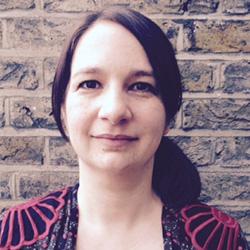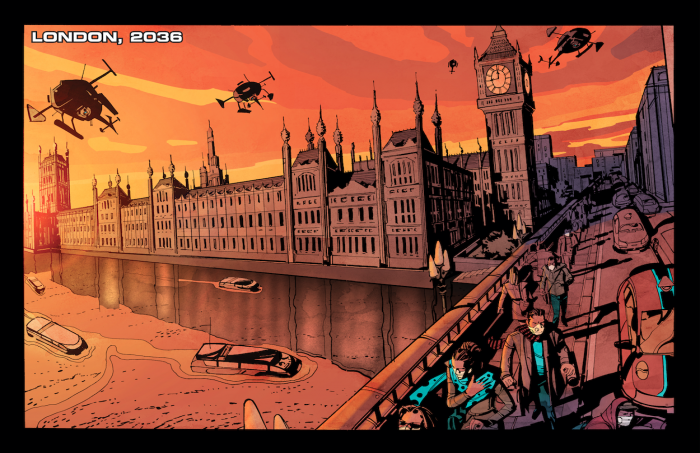Expert Spotlight: Five Questions with Sara Kenney
The year is 2036. Effective antibiotics are in short supply due to the spread of dangerous superbugs that kill 9 million people every year. Political instability, class struggle, and heartbreak abound.
Welcome to the premise of Surgeon X, a comic book series published by Image Comics, from the creative mind of Sara Kenney and drawn by the late, highly respected artist John Watkiss. The tragic heroine, Rosa Scott, is a surgeon gone rogue, bucking unjust antibiotic rationing rules, treating patients with black-market drugs, and all the while trying to solve the mystery behind her altruistic mother’s mysterious death and potential key to beating superbugs.
Here at the Antibiotic Resistance Action Center, we firmly believe that creative communication is critical to improving understanding of the superbug crisis and prompting action. That’s why we were thrilled when Sara Kenney agreed to answer a few questions about Surgeon X. (Be sure to follow Surgeon X via its website, Twitter and Facebook. Also, there’s a new 12-page special that you can download for free.)
1. Of all the pressing public health issues out there, why did you choose to focus on antibiotic resistance in this comic? Do you remember when you first realized the gravity of this impending crisis?
The whole storyworld was several years in the building. I started with the character - surgeon Rosa Scott. I wanted her to work in the future where she had access to weird and wonderful scientific and technological advancements. When you’re creating a character and story you’re always looking for obstacles to throw at them. The more I researched the the future I realized that the antibiotic crisis was the mother of all obstacles. How can a doctor function when the bedrock of modern medicine has crumbled around them?
I started to speak to experts — microbiologists, surgeons, historians, ethicists, sociologists — I wanted to explore the characters and storyworld from all angles. The more I spoke to them the more I realized that this was a potentially terrifying storyworld. Surgeon X is a ‘what if’ we don’t solve this problem? I always describe it as a thought experiment – a place that we don’t want to be in 20 years time.
But it all comes back to character – how do people function in this world and what do the decisions they make say about them as a character? Rosa changes from a darling of the National Health Service (NHS) to someone who breaks free from her Hippocratic Oath. Her twin sister Dr. Martha Scott is a microbiologist looking for new antibiotics and tries to be Rosa’s moral compass. The more I researched this aspect, the more it consolidated my view that science problems are never just about science. We knew about resistance decades ago, in fact Alexander Fleming spoke about it in his Nobel Prize winning acceptance speech in 1945. But without the economic and political will to do something about it, we end up in a dangerous place.
So the antibiotic crises setting, came out of my exploration of the character. For me it was an obvious, visceral and tangible aspect of medicine to focus on. What if we fail to solve this problem and many of our antibiotics are no longer working? It’s a world that is a massive challenge for all the characters, and particularly a doctor.
2. One of the most fascinating aspects of the series for us (Washington, D.C.-based political junkies) was seeing how antibiotic resistance plays out in politics and contributes to dramatic social inequality. For those who have not yet read the series, can you describe the political state of affairs in brief and how it affects more vulnerable populations?
I started really building the storyworld in 2014 and we’d all seen the rise of the far right across Europe. I couldn’t have predicted how political events would unfold over the proceeding years, but things seemed to scarily align with the storyworld. In Surgeon X a far-right government is in power and they have recently brought in an ‘Antibiotic Austerity Act’ (Act), which means antibiotics are no longer given out purely based on medical need. The Act states that an individual will be judged on their ‘economic benefit to society’. This means that the elderly, disabled (including children), drug addicts or people on the fringes are lower down the list in terms of gaining access to the remaining viable antibiotics.
Now I didn’t pluck this idea from thin air, it was based on an article I’d read. You probably know there’s an organisation in the UK called the National Institute for Healthcare Excellence or NICE. They are the medicines watchdog who decide which drugs the NHS should pay for.
In 2013, the UK Government proposed to NICE that they should make judgments on the ‘wider societal benefit’ of medicines. The government were asking NICE to put a monetary value on the people who were likely to take the drugs, in terms of their contributions to society. So that would mean older people with less years to work would score lower, women who were mothers and didn’t work would score lower than their working husbands. Sound familiar?? NICE rejected this proposal in 2014.
In Surgeon X a more extreme version of this proposal is put forward, but not for all medicines, just for antibiotics. The current system does not work like this, but if a Conservative government can propose something along those lines in 2013, what’s to say a far-right government wouldn’t go that route in 20 years time in the midst of an antibiotic apocalypse?
3. As a scientist and documentarian, why did you choose to tell this story in the form of comics? What does this medium offer that others do not?
I was brought up on a diet of science fiction and introduced to comics at a young age. Comics allow you to explore extreme worlds and tell stories in inventive ways. As a documentary filmmaker what I found is that if I was making a science film – they contained scientists and rarely could you include experts from other disciplines. This doesn’t make sense to me, but it’s the way things work. I’m really interested in all aspects of science stories and I always want to know more about the people who work in science. What motivates them? What biases do they have? What are their personal traits that make them more complicated characters?
Also, expressing a story through the incredible art and design is a wondrous thing to do. What a pleasure it was to work with the artist John Watkiss, colourist James Devlin, letterer Jared Fletcher, designer Richard Bruning and my brilliant story editor Karen Berger. Their genius helped realize this storyworld and it wouldn’t have been the same in any other medium.
4. We see that you received funding from the Wellcome Trust. Can you please discuss the role of public health and non profit organizations in the creation of this series? Additionally, how do you think the arts and humanities fit in the greater fight against antibiotic resistance?
I don’t know of any other organisation in the world who would have funded this. In my opinion in terms of public engagement they are truly visionary. That is because they believe that art and science are needed to help ‘improve health for all’ and that both these disciplines have an important role to play. The Wellcome Trust are an independent charity so they are free from political or financial controls. They were able to fund me and then give me the freedom to create the project in the way we saw fit. Don’t get me wrong they have a very stringent application process, but they are prepared to take risks – as long as they are calculated risks!
It’s obvious to me that the antibiotic crises will need to be tackled from many angles, that we need both our scientists and our artists. But ultimately as a comic writer my role is tell a good story about this possible future world. As a writer it’s not my role to tell anyone what to think, but to just tell a story in a way that I hope intrigues or inspires others. It’s up to the audience to come to their own conclusions about both the characters and the storyworld.
One thing I would say is that I think comics are a hugely underrated medium. If you’ve never read one, go into your local comics store, tell them what you like in terms of TV or novels. They’ll be able to recommend you something and I challenge to you not to love the incredible combination of comic storytelling!
In terms of nonprofits funding this sort of thing, since the first comic I’ve had the Royal Society of Chemistry, Microbiology Society and Society for Applied Microbiology all support my comic endeavours. I think comic storytellers are a hugely important and visionary part of our culture and if we recognize this there are opportunities for many fine collaborations.
Update: Since our interview, Sara has been named a Wellcome Trust Engagement Fellow and will explore how comic creators, biomedical scientists, medical humanities experts and comic audiences can interact, with the hope of inspiring and empowering people from traditionally different worlds.
5. What’s next for Surgeon X? We are dying to know!
I have a lot of ideas about what could happen in the second storyline. We still have quite a few things to reveal! Sadly since our artist died we’re regrouping and thinking about what we do next and when. To be continued …



